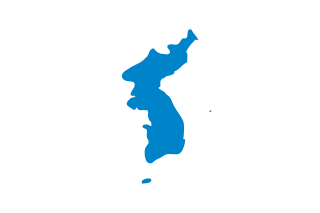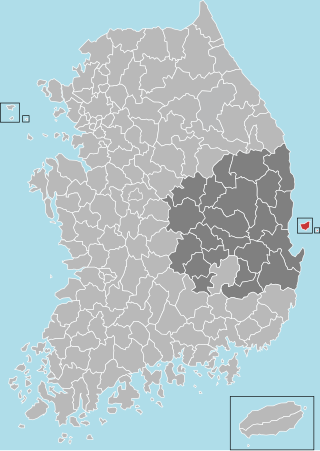
Korean reunification is the hypothetical unification of North Korea and South Korea into a singular Korean sovereign state. The process towards reunification of the peninsula while still maintaining two opposing regimes was started by the June 15th North–South Joint Declaration in June 2000, was reaffirmed by the October 4th Declaration in October 2007 and the Panmunjom Declaration in April 2018, and the joint statement of United States President Donald Trump and North Korean leader Kim Jong Un at the Singapore Summit in June 2018. In the Panmunjom Declaration, the two countries agreed to work to officially end the Korean conflict in the future.

North Korea competed as the Democratic People's Republic of Korea at the 2004 Summer Olympics in Athens, Greece, from 13 to 29 August 2004. This was the nation's seventh appearance at the Olympics since its debut in 1972. North Korean athletes did not attend the 1984 Summer Olympics in Los Angeles, when they joined the Soviet boycott, and subsequently, led a boycott at the 1988 Summer Olympics in Seoul, along with six other nations.

The 2018 Winter Olympics, officially the XXIII Olympic Winter Games and also known as PyeongChang 2018, were an international winter multi-sport event held between 9 and 25 February 2018 in Pyeongchang, South Korea, with the opening rounds for certain events held on 8 February, a day before the opening ceremony.

Ulleung County is a county in North Gyeongsang Province, South Korea.

Ulleungdo, also spelled Ulreungdo, is a South Korean island 120 kilometres east of the Korean Peninsula in the Sea of Japan, formerly known as Dagelet Island or Argonaut Island in Europe. Volcanic in origin, the rocky steep-sided island is the top of a large stratovolcano which rises from the seafloor, reaching a maximum elevation of 984 metres (3,228 ft) at Seonginbong Peak. The island is 9.5 kilometres (6 mi) in length and ten kilometres (6 mi) in width; it has an area of 72.86 km2 (28.13 sq mi). It has a population of 10,426 inhabitants.

The Rusk documents are the official diplomatic correspondence sent by Dean Rusk, the United States Assistant Secretary of State for Far Eastern Affairs, to Yang You-chan, the South Korean ambassador to the U.S. on August 10, 1951.

The association football tournament at the 2012 Summer Olympics was held from 25 July to 11 August, and was the only sport to begin before the official opening day of the Olympic Games, two days before the opening ceremony. It was also the only sport to be held at multiple venues outside London, with Manchester, Glasgow, Newcastle, Coventry and Cardiff all hosting matches. The finals were played at Wembley Stadium. Associations affiliated with FIFA were invited to send their senior women's and men's under-23 national teams to participate; men's teams were allowed to augment their squads with three players over the age of 23. Five hundred and four football players competed for two sets of gold medals.

The Liancourt Rocks, also known by their Korean name of Dokdo or their Japanese name of Takeshima, are a group of islets in the Sea of Japan between the Korean peninsula and the Japanese archipelago administered by South Korea. The Liancourt Rocks comprise two main islets and 35 smaller rocks; the total surface area of the islets is 0.187554 square kilometres and the highest elevation of 168.5 metres (553 ft) is on the West Islet. The Liancourt Rocks lie in rich fishing grounds that may contain large deposits of natural gas. The English name Liancourt Rocks is derived from Le Liancourt, the name of a French whaling ship that came close to being wrecked on the rocks in 1849.

An Yong-bok was a Korean fisherman in 17th century of Joseon Dynasty famous for his travels to Japan. His activities were instrumental in determining fishery rights in the waters of Ulleungdo and the Liancourt Rocks, two islands in the East Sea.

The Liancourt Rocks dispute, also called the Takeshima dispute or Dokdo dispute is a territorial dispute between South Korea and Japan regarding sovereignty over the Liancourt Rocks, a group of small islets in the Sea of Japan. The rocks also go by the names Dokdo and Takeshima. North Korea also claims sovereignty of the islands, but has not pursued its claim to the same extent as the other parties.

The 2018 Winter Paralympics, the 12th Paralympic Winter Games, and also more generally known as the PyeongChang 2018 Paralympic Winter Games, were an international multi-sport event for athletes with disabilities governed by the International Paralympic Committee (IPC), that was held in Pyeongchang, South Korea, from 9 to 18 March 2018. They were the second Paralympics to be held in South Korea, following the 1988 Summer Paralympics in Seoul.
Dokdo Museum is the name used for two museums in Korea that relate to the Liancourt Rocks, known as Dokdo in Korean. One of the museums is located in Ulleungdo and the other, which opened later, is in Seoul.
During the Parade of Nations portion of the 2000 Summer Olympics opening ceremony, athletes from each country participating in the Olympics paraded in the arena, preceded by their flag. The flag was borne by a sportsperson from that country chosen either by the National Olympic Committee or by the athletes themselves to represent their country.
During the closing ceremony of the 2018 Winter Olympics in Pyeongchang, the flag bearers of 92 National Olympic Committees (NOCs) arrived into Pyeongchang Olympic Stadium on February 25. The flag bearers from each participating country entered the stadium informally in single file, and behind them marched all the athletes. The flags of each country were not necessarily carried by the same flag bearer as in the opening ceremony. The flag-bearers entered in ganada order of the Korean alphabet.

North Korea competed in the 2018 Winter Olympics in Pyeongchang, South Korea. Pair skaters Ryom Tae-ok and Kim Ju-sik qualified for the Games, but the North Korean National Olympic Committee failed to enter them by the 30 October 2017 deadline. On 9 January 2018, North Korea agreed in negotiations with South Korea to send both athletes and a delegation to the Winter Olympics.

A unified team of North and South Korea has played at certain sports competitions under the name Korea.

A unified team of South Korea and North Korea competed under the title "Korea" at the 2018 Winter Olympics in ice hockey.
The Dokdo Volunteer Garrison (Korean: 독도의용수비대) was a South Korean paramilitary outpost on the Liancourt Rocks. Both South Korea and Japan each claim sovereignty over the islands. The garrison was established by volunteers from Ulleungdo Island and the Korean Veterans Association, and was led by Hong Sun-chil. The garrison was a private organization that is considered to have laid the foundation for South Korea to exercise practical territorial sovereignty over the islands. According to multiple sources, including the Encyclopedia of Korean Culture, the garrison engaged in several clashes against the Japan Coast Guard, and was maintained from 1953 to 1956 until South Korean police forces fully took over operations over the island.

South Korea and North Korea competed in some events at the 2018 Asian Games as a unified team, under the title "Korea". Both nations also marched together under a unified flag during the opening and closing ceremonies.
















